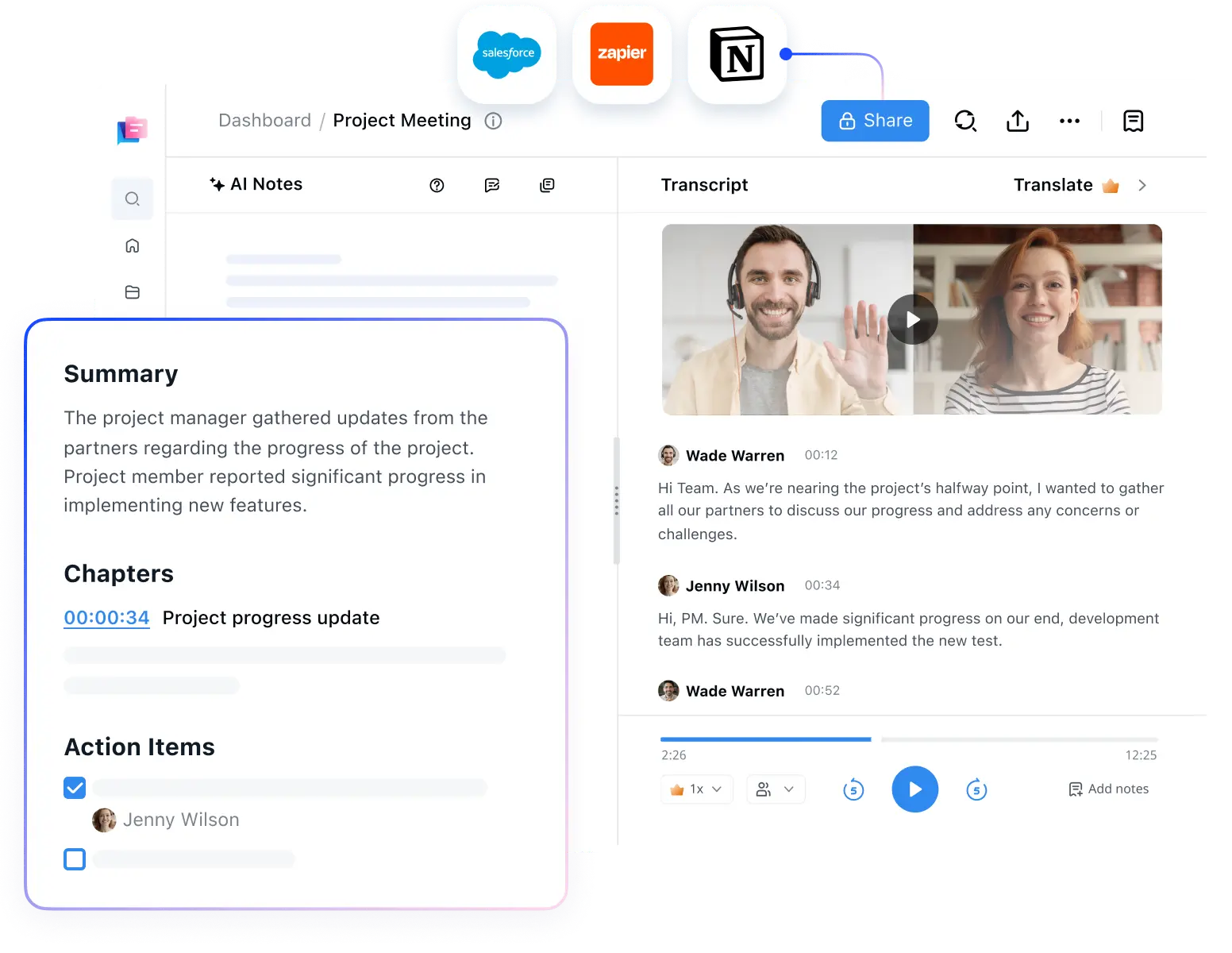If someone asked you about one thing that’s crucial to any organization’s functioning, what would it be? If you thought of meetings, you’d be absolutely right. Meetings are crucial for several reasons — sharing information and ideas, strategizing, gathering feedback, and, in many cases, building meaningful relationships at the workplace.
Despite all these benefits, however, meetings often end up being ineffective and unproductive. These concerns highlight the importance of meeting feedback surveys, and I have seen first-hand how they can improve the quality of remote meetings over time.
In this detailed guide, I’ll tell you what makes meeting feedback surveys important and the different types of meeting feedback survey questions. I’ll also give you a template to help you design your own surveys.
Why are meeting feedback survey questions important?
While in-person or remote meetings are often considered essential to the efficiency of an organization’s functioning, they often end up being inefficient or ineffective. This is where meeting feedback surveys play a critical role. Some of the reasons why they’re important include:
They offer key insights into how successful a meeting was, allowing you to make necessary improvements going forward.
They help boost employee morale and engagement by showing them their opinions matter and incentivizing them to provide honest feedback.
They help organizers understand whether or not meetings effectively meet their desired outcomes.
They help optimize the return on investment by offering key insights into how meetings can be tweaked to be a more productive use of your employees’ time and energy.
Last but not least, they allow organizations to benchmark the success of their operations with time by gauging key improvements in performance across departments.
As you can see, a meeting feedback survey plays a critical role in improving an organization’s efficiency while optimizing its employees’ time.
Types of meeting survey questions to ask
In the following sections, we will take a closer look at some of the key post-meeting survey questions you must include so you can gather comprehensive insights into its success. I’ve also categorized them based on their intended outcomes.
General meeting feedback questions
Given below are a few general meeting feedback survey questions you can ask your attendees. These are a great way to keep your finger on the pulse of your meetings’ overall success without getting into any specifics.
How would you rate the overall effectiveness of the meeting?
Were the meeting’s objectives clearly communicated beforehand?
Did the meeting extend beyond the scheduled time?
How would you rate the overall level of engagement during the meeting?
Was your opinion given adequate consideration?
Do you feel like this meeting was a valuable use of your time?
Did the meeting conclude with its key objectives being met?
How would you rate the pace and the format of the meeting? Do you have any alternative suggestions on how to conduct these meetings?
Would you like to offer any feedback on the effectiveness of the meeting?
Meeting effectiveness questions
For a meeting to achieve its intended outcomes, it must be effective. This section consists of questions you can ask your meeting’s attendees to specifically evaluate this criterion.
To what extent did the meeting achieve its intended objectives?
What aspect of this meeting did you find the most valuable or insightful?
Did you have a clear idea of your key action points or next steps by the end of the meeting?
Did the meeting cover the topics you expected based on its intended objectives?
To what extent were the topics discussed relevant to your specific role?
What feedback would you like to offer to ensure the meeting effectively meets its goals?
Was every member present given the time to put their points across without interruption?
One of the best ways of making meetings more effective is to use an AI meeting assistant that can help summarize what was discussed for later reference. A tool like Notta, for instance, can be a great option that can record, transcribe, and summarize meetings for you.
Meeting performance questions
While evaluating the effectiveness of a meeting is key, ensuring that it leaves every attendee with the tools required to achieve maximum performance is equally essential.
The key purpose of asking meeting performance questions is to evaluate your team’s opinions on the goals set and whether or not they’re realistic, the team’s overall performance, or even that on an individual level. Some meeting questions you can ask to assess your meeting’s performance include:
Do you think the meeting offered you the tools and information necessary to meet your goals?
To what extent did we achieve the goals set before the meeting?
On a scale of 1-10, how would you rate our team’s performance before the meeting?
How likely do you think this meeting will further improve our team’s performance?
Were the goals set during the meeting realistic?
Do you think we need to revise the goals set during the meeting to ensure we can meet them effectively?
Do you feel like the meeting was a productive use of your time at work?
How would you rate my performance as a meeting leader?
Would you like to offer any feedback that can help me streamline meetings better in the future?
Employee satisfaction questions
The introduction to this guide has established that most of us often dread the thought of attending a meeting. In fact, according to research conducted by Atlassian, 47% of workers in the US believe meetings to be the #1 time waster at the office.
As a result, it’s not surprising that frequent, ineffective meetings can lead to a significant decline in morale and employee engagement. This is why it’s crucial to assess your employees’ satisfaction with respect to meetings. Here are a few questions you can include in your feedback survey:
On a scale of 1-10, how satisfied are you with the quality of the meetings conducted at the organization?
How engaged did you feel over the course of the meeting?
Did you feel like your presence added value to the meeting?
Did the meeting make you feel more or less excited about your upcoming tasks/projects?
Did the meeting instill or add to a sense of burnout?
Are you satisfied with how frequently we conduct meetings at the organization?
Do you feel like the meeting was either too long or too short?
Do you believe the action items introduced during the meeting are followed up on and tracked before your next sit-down?
On a scale of 1-10, to what extent do you feel like these meetings contribute to your personal and professional growth?
Would you like to offer any suggestions on how we can make these meetings more engaging?
Do you have any feedback on the frequency of the meetings and their effectiveness?
Personal and professional development questions
An employee’s personal and professional development is crucial to their job satisfaction. Just like statistics have shown a direct correlation between employee training and long-term retention, meetings must prove to aid employees’ personal and professional development.
Here are a few questions you must include in your post-meeting survey to understand how well it meets this criterion:
On a scale of 1-10, how well do you think these meetings help you grow professionally in your role and career?
Do these meetings help you identify and learn skills crucial to your role at the organization?
Did the meeting help you gain a new perspective on an issue or process?
On a scale of 1-10, how useful do you find these meetings for your personal development?
Do these meetings offer you the space to engage in interactions that feel genuine?
Would you like to offer any feedback on how our meetings can help with your personal and professional growth?
Meeting feedback survey questions template
Given below is a template of how you can design your post-meeting feedback survey. The questions you ask must depend on the insights you aim to gain from them.
Template:
Meeting Feedback Survey
The following questions are intended to identify areas of improvement to help us improve the effectiveness, pace, and value proposition of the meetings we conduct. All responses are anonymous, and we’d appreciate your taking the time to provide us with your honest feedback.
Question 1: How would you rate the overall effectiveness of the meeting?
Excellent
Very Good
Good
Fair
Poor
Question 2: Did the meeting conclude with its core objectives being met?
Question 3: Was the meeting a valuable use of your time?
Question 4: Did you have a clear idea of your targets or action points by the end of the meeting?
Question 5: How would you rate the pace and format of the meeting?
Excellent
Very Good
Good
Fair
Poor
Question 6: Do you have any feedback on how these meetings can be made more effective/collaborative/engaging?
Answer: _____________________________________________________________________
Thank you for your responses!
Tips for writing meeting feedback survey questions
While the sections above offer questions based on a host of different intents, the ones you incorporate into your post-meeting surveys must depend on what insights you aim to gain. Regardless of the outcome, there are certain things you must keep in mind when curating a survey. Here are a few best practices that can help:
Survey immediately after meetings: It’s essential that you send out your post-meeting survey immediately after a meeting ends to ensure you receive accurate responses.
Keep the questions simple: A simple and clear question is more likely to receive an accurate response and minimize post-meeting fatigue.
Include a mix of questions: Your surveys must ideally combine open-ended and closed-ended questions. While the former helps employees express their opinions freely, the latter helps you derive actionable quantitative data.
Keep your surveys short and crisp: Most employees already consider meetings excessively time-consuming, and a lengthy survey will only exacerbate fatigue. Shorter, crisper surveys are more likely to be carefully answered and show that you value your employees’ time.
Key takeaways
Meeting feedback survey questions are critical in ensuring the time and resources spent on meetings yield the highest possible return on investment. Considering how time-consuming they can be, organizations must ensure they gather valuable feedback on how they can make their meetings more effective, efficient, and constructive.
This guide has listed over 40 questions you can ask your employees at the end of a meeting to identify areas of improvement. I’ve further categorized it to include general questions, along with those about a meeting’s effectiveness, performance, and employee satisfaction, among others. If you’re someone who believes in the tremendous value meetings can offer, you’ve likely considered using an AI-powered meeting assistant.
With Notta, you can automate the process of recording, transcribing, and summarizing your meetings to derive actionable insights and drive success.

Make the most of your meetings
Notta AI meeting assistant records, transcribes, and summarizes meetings so everyone can stay engaged without missing important details.
FAQs
What are good survey questions for feedback?
You can ask your team questions about the meeting’s effectiveness, performance, or contribution to their personal and professional development. Here are five questions you can ask -
How would you rate the overall effectiveness of the meeting?
Did the meeting conclude with its core objectives being met?
Did the meeting give you a clear idea of your action points?
Do you feel like the meeting was a productive use of your time?
Were your contributions considered over the course of the meeting?
Why should you collect post-meeting feedback?
Post-meeting feedback is critical to evaluating its effectiveness, gathering insights about the level of engagement, and any potential areas of improvement for the future. The feedback collected can help you design and conduct more productive and effective meetings while improving employee satisfaction.

